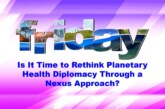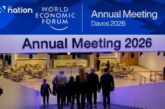
Dr. Arvind Kumar*
The global leaders from politics, businesses, and civil societies converging in the Swiss Alpine town have a full agenda, addressing issues from economic development to climate change and AI, but all eyes are likely to be on Trump’s political resurgence.
It’s that time of the year again, when the Swiss Alpine town is hosting the Annual Meeting of the World Economic Forum under the theme “Collaboration for the Intelligent Age”. The topic of “rebuilding trust” aims to explore how stakeholders can find new ways to collaborate on solutions both internationally and within societies. The WEF Annual Meeting will also host 26 live sessions on the theme of “safeguarding the planet”. This includes everything from carbon pricing and nature markets to changes in the weather and COP30. This year’s event comes on the heels of a war in Ukraine and the humanitarian situation in Gaza, the alarming regularity of extreme weather events, and the unfolding artificial intelligence (AI) revolution. The aim is to work together to rebuild trust and shape the principles, policies, and partnerships needed to meet the challenges of 2025 and to address systemic risks to avoid uncertainty and fragility.
However, President Donald Trump’s aversion to this collaborative approach through his recent executive orders of withdrawal from Paris Agreement and WHO that attempts to restrain the United States’ financial allocations to other countries towards the goal of mitigating climate change and adapting to climate change worldwide. This also brings forth an announcement of a “national energy emergency” outlining a raft of changes that reverse US climate regulations and boost oil and gas production, leaving the world open for other countries to fill in that leadership vacuum. “We have been here before,” United Nations Climate Change Executive Secretary Simon Stiell said at the World Economic Forum 2025. A key difference between Trump’s 2017 decision to withdraw from the Paris Agreement and Monday’s executive order, Stiell said, was the “significant momentum” to combat global warming in the intervening eight years. “The world is undergoing an energy transition that is unstoppable. Last year alone, over $2 trillion was invested in the transition and that compares to $1 trillion in fossil fuels, so the signal is absolutely clear,” Stiell said.
When President Trump signed an executive order to withdraw the United States from the Paris climate agreement and WHO on Monday as part of his flurry of moves upon taking office, it represented a shot across the bow of the world leaders and chief executives gathered in the quaint snow-covered Swiss town of Davos, Switzerland. Among them are many political and business figures who have signed to reduce global-warming emissions, such as the Paris Agreement, which virtually every country in the world agreed to in 2015.Pulling the United States out of the pact is a signal of both the administration’s lack of concern about rising planet-warming emissions, and also a rebuke of the kind of multilateralism that has come to define Davos.
Abdication- A quick refresher
The Paris Agreement, signed by nearly 200 countries in 2015, aims to limit global warming to well below 2°C above pre-industrial levels, with a target of 1.5°C to avoid catastrophic climate impacts. Experts warn that without drastic reductions in emissions, critical tipping points may be breached, leading to irreversible damage to Earth’s systems. The U.N. Secretary-General has pointed out that such an action undermines collective action against climate change, which increasingly becomes urgent, as extreme weather events become frequent and severe.
It has taken a worrisome step, as this move comes at a time when, for the first time in a calendar year, global temperatures exceeded 1.5C above pre-industrial levels in 2024; the climate crisis already disrupting lives and livelihoods, raising urgent questions about the future of both national and global efforts to tackle climate change. Specifically, what are the implications of this action of the world’s largest historical emitter stepping away when it does so? How is this likely to affect the Developing nations who bear the rising cost of a warmer planet?
Moreover, this withdrawal not only hampers international climate initiatives but also poses risks for public health on a global scale. The World Health Organization (WHO) plays a vital role in addressing health crises exacerbated by environmental factors, including those linked to climate change. By withdrawing from both the Paris Agreement and WHO, the U.S. diminishes its influence in shaping global health and environmental policies. This retreat could lead to slower responses to health threats that cross national borders and diminish collaborative efforts needed to combat climate-related health issues. As communities worldwide grapple with the escalating costs of climate change—such as increased healthcare burdens and economic instability—the implications of the U.S. withdrawal will likely resonate far beyond its borders, affecting global efforts to create a sustainable and healthy future for all.
Implications for the World
The most inconvenient thorn in this grand scheme is the pesky Paris Agreement, which dares to demand that the US curb its emissions. Naturally, Trump’s solution is to simply scrap the agreement altogether. After all, he’s long griped that international climate regulations are oh-so-unfair to the US, especially since China, conveniently labelled a developing country, isn’t held to the same standards.
But here’s the kicker: the US holds the dubious honour of being the largest contributor to historical emissions for nearly 22% of the carbon dioxide put in the atmosphere since 1950, according to Global Carbon Project. By that logic, it bears the greatest responsibility for cleaning up the mess- a responsibility it has barely even pretended to take seriously. It’s almost as if he’s auditioning for a role in a dystopian film where the plot revolves around sabotaging international cooperation. By pulling out of the Paris Agreement, Trump is effectively saying, “Why bother helping those who are already struggling?” This withdrawal is not just a symbolic gesture; it has real-world implications. The U.S. previously pledged $3 billion to the Green Climate Fund, which supports developing nations in their fight against climate change. With Trump’s latest move, that funding is now vapourware-poof!—leaving vulnerable countries without essential resources for mitigation and adaptation efforts. It’s as if he’s flipped a switch that turns off the lights for those already living in the dark.
On the health front, withdrawing from the WHO sends a clear message: “We’re not interested in global health or cooperation; we’ll just go it alone.” This decision halts U.S. funding with the agency receiving around a fifth of its funds from the country. In assessed contributions, the United States is the biggest payer, accounting for 22.5% of the contributions, followed by China at 15%. The WHO participates in and supports several health programmes across the world, such as neglected tropical diseases, HIV-malaria-and tuberculosis, and anti-microbial resistance, among others. Importantly, it plays a significant role in immunisation programme, with WHO teams even monitoring vaccine coverage. A funding cut like this would mean they will not be able to effectively implement these programmes. In addition, the loss of expertise from the United States would also impact WHO’s role of providing guidance. This will also sever the collaboration between the WHO and the US Centres for Disease Control and Prevention (CDC), which is key to international surveillance and response to health threats. The irony is rich; while Trump criticizes WHO’s handling of pandemics, he simultaneously pulls out funding that could help improve global health responses.
Onwards and Upwards
The way forward lies in fostering alternative leadership, strengthening multilateral frameworks, and advocating for a renewed commitment to global solidarity. Efforts must focus on empowering the developing nations by strengthening their access to climate finance, technology transfer, and health resources. Additionally, catalysing grass root movements, building coalitions across sectors, and providing data-driven insights to influence both public opinion and policy. It is imperative to highlight the economic opportunities of green energy, the necessity of resilient healthcare systems, and the moral responsibility to address historic emissions. Collaboration, innovation, and multi-stakeholder commitment to equity must define the path forward to ensure a liveable planet and a healthier future for all.
Picture this: wealthy nations, having gorged themselves on decades of carbon-rich feasts, now push away from the table, leaving developing countries to clean up the greasy, overheated mess. Trump’s legacy isn’t just a policy—it’s a master class in global abandonment. The irony is delicious: when developing nations finally muster the courage to stride towards sustainable development, the historic emission gluttons suddenly develop a convenient case of diplomatic amnesia. “Who? Us? Responsible? Ha! Let’s get one thing crystal clear: we’re not playing a game of planetary musical chairs. There’s only one Earth, and surprise—we all have to live on it! The choice is simple: work in synergy or perish in spectacular, sweltering disharmony.
*Editor, Focus Global Reporter






